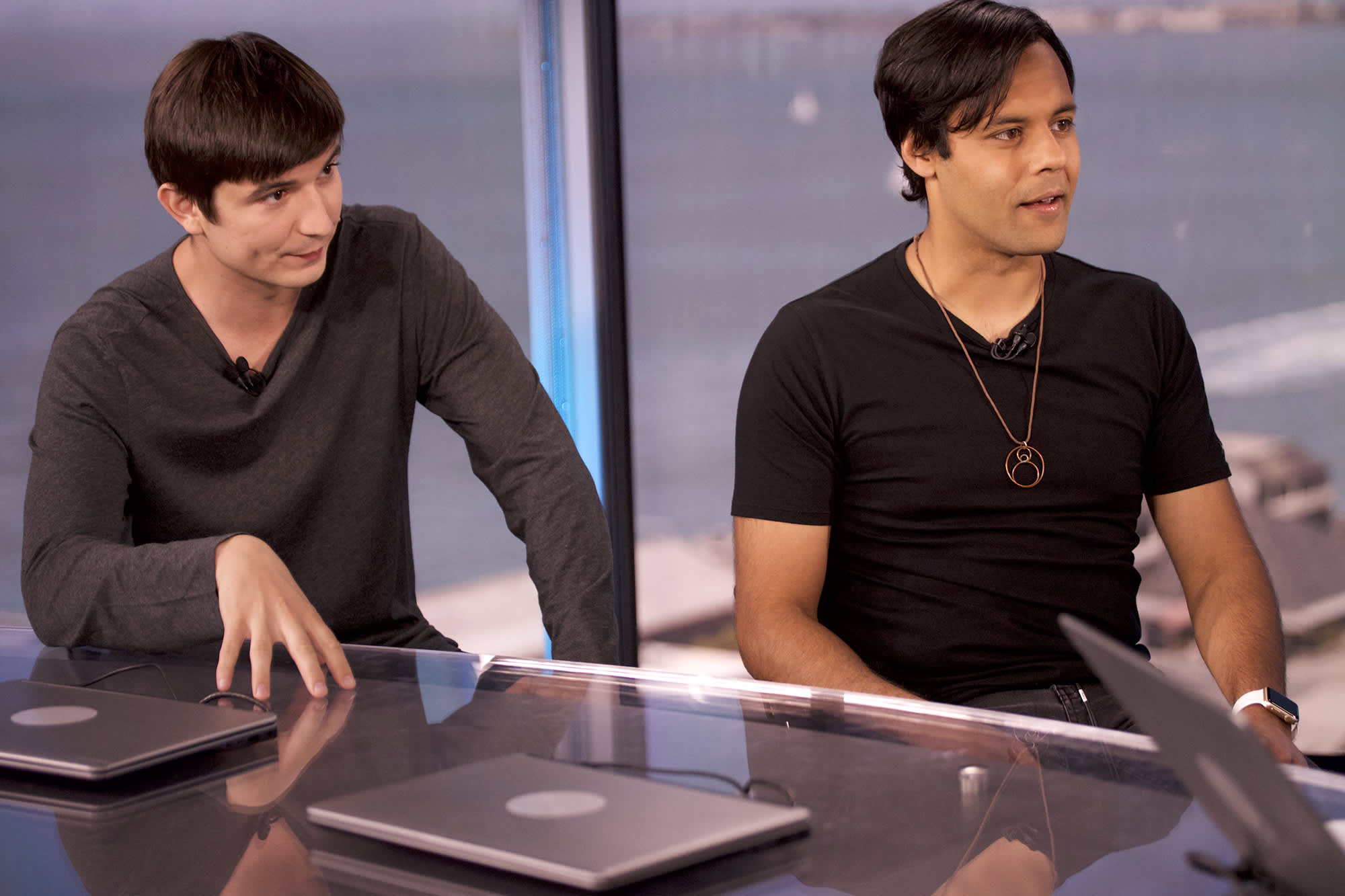Fintech is minting billionaires by the month.
Already this year, Coinbase’s co-founders have joined the billionaire ranks, along with the founders of Affirm and Marqeta. For years, Silicon Valley has been taking on the banking incumbents with promises of a better customer experience, but it’s only now that emerging trading apps, payment upstarts and online lenders are achieving big public market valuations.
Now, it’s Robinhood’s turn.
Vlad Tenev and Baiju Bhatt, who were roommates at Stanford almost a decade ago, are each poised to be worth about $2.6 billion on paper when their trading app debuts on the Nasdaq later this month. That’s based on the $40 mid-point of the company’s price range given in its updated IPO prospectus on Monday.
Tenev, Robinhood’s CEO, and Bhatt, the chief creative officer, will each own 7.9% of the company’s outstanding shares, according to the filing. They’re also each selling about $50 million worth of shares in the offering.
It’s been a banner year for tech listings, with at least 12 companies that went public through an IPO, direct listing or special purpose acquisition company (SPAC) attaining a market capitalization of $10 billion or more. Between those companies and a few others with lower valuations, the tech industry has minted 16 billionaires in 2021.
Fintech is capturing an outsized share of the gains.
Coinbase CEO Brian Armstrong owns stock in his cryptocurrency app worth about $8.7 billion after the company’s direct listing in April. Fred Ehrsam, who co-founded the company with Armstrong in 2012, owns a $2.7 billion stake. Marqeta CEO Jason Gardner is worth close to $2 billion after taking his payment technology company public last month, while Affirm’s Max Levchin owns shares valued at over $1.5 billion in his online lender, which held its IPO in January.
SoFi, a provider of college loans, home loans and a variety of investment and insurance products, went public through a SPAC in June and is now valued at $12 billion, though no individual holder owns a billion-dollar stake.
That’s before dipping into the companies that are still private. Payments company Stripe was valued at $95 billion in a financing round in March, giving sibling co-founders Patrick and John Collison a combined stake of $23 billion, according to the Bloomberg Billionaires Index. Klarna, a Swedish payments company, is now worth $46 billion on the private market. Klarna CEO Sebastian Siemiatkowski has a net worth of $2.2 billion, according to Forbes.
The list goes on. Chime, which delivers banking services through mobile phones, is worth $14.5 billion, while Plaid, which provides back-end technology that connects apps with bank accounts, is valued at $13 billion after Visa was forced to scrap its planned acquisition of the company.
“Our market is seeing a sea change, with consumers that we never thought would be embracing digital finance engaging with it in a big way,” Zach Perret, Plaid’s CEO and co-founder, told CNBC, when the latest financing round was announced in April.
Robinhood said it plans to sell shares at $38 to $42 each prior to its expected Nasdaq debut next week. That could value Robinhood at up to $35 billion, up from a private market valuation of $11.7 billion in September.
Users flocked to Robinhood in the first quarter as crypto trading volumes soared and the popularity of meme stocks like GameStop and AMC Entertainment led millions of new traders to the app. At the end of March, Robinhood had 17.7 million monthly active users, up from 11.7 million at the close of 2020.
Robinhood co-founders will retain voting control
Tenev, 34, and Bhatt, 36, have dealt with their share of troubled headlines this year on the path to what will likely be one of the biggest IPOs of 2021.
While the increased activity was a major boon to Robinhood’s revenue, the company had to halt trading of GameStop and other stocks in January because the unexpected surge in volume created a liquidity crunch.
“In order to protect the firm and protect our customers we had to limit buying in these stocks,” Tenev told CNBC’s Andrew Ross Sorkin after the restrictions were put in place.
Robinhood ultimately raised $1 billion from investors to shore up its balance sheet, but the incident raised questions about the company’s business model, known as payment for order flow. Robinhood lets users buy and sell for free, and charges market makers such as Citadel Securities or Virtu for the right to execute customer trades.
The Financial Industry Regulatory Authority said in June that Robinhood will pay roughly $70 million in penalties for its systemwide outages and misleading communication and trading practices. The company faces dozens of proposed class-action lawsuits, as well as examinations or investigations by regulators, state attorneys general, the SEC, FINRA, and the U.S. Department of Justice.
In its initial prospectus earlier this month, Robinhood disclosed that Tenev’s phone was seized by federal attorneys as part of the GameStop probe.
Still, Robinhood’s co-founders, who are both board members, are positioned to profit handsomely when the company goes public and will control the vast majority of decisions from here.
Tenev and Bhatt will own all of Robinhood’s Class B shares after the offering. Those shares have 10 times as much voting power as Class A shares, according to the prospectus, giving Tenev will control of 26% of voting power, and Bhatt control of 39%.
They’ve already cashed out tens of millions of dollars worth of shares.
In 2018, they each sold $55 million of stock to investment firm DST Global in a secondary transaction, and the following year the co-founders participated in a $67.6 million tender offer available to “certain of our employee stockholders,” the filing said.
Robinhood is a five-time CNBC Disruptor 50 company that topped this year’s list.
Sign up for our weekly, original newsletter that offers a closer look at CNBC Disruptor 50 companies like Robinhood, and the founders who continue to innovate across every sector of the economy.
WATCH: CNBC’s full interview with Plaid CEO Zach Perret
